Invitation to the Waltz is a 1935 British historical musical film directed by Paul Merzbach and starring Lilian Harvey, Wendy Toye and Carl Esmond. It was based on a play by Eric Maschwitz.
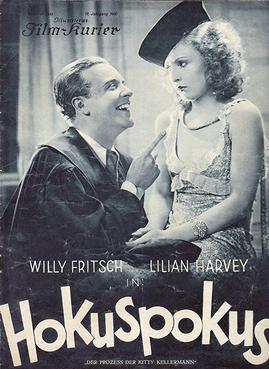
Hocuspocus is a 1930 German comedy film parallel version directed by Gustav Ucicky, starring Anglo-German Lilian Harvey, Willy Fritsch, and Oskar Homolka. It was the first adaptation of the 1926 play Hokuspokus by Curt Goetz, but used different role names.

Bright Eyes is a 1929 British-Austrian silent romance film directed by Géza von Bolváry and starring Betty Balfour, Jack Trevor, and Fritz Greiner. It is also known under the alternative title of Champagner.
The Vagabond Queen is a 1929 British comedy film directed by Géza von Bolváry and starring Betty Balfour, Glen Byam Shaw, and Ernest Thesiger. It was the final film directed in Britain by Bolváry before he returned to Germany. It was made by British International Pictures. A young woman takes the place of a Princess who is a target for an assassination.
Number 17 is a 1928 German-British silent crime film directed by Géza von Bolváry and starring Guy Newall, Lien Deyers, and Carl de Vogt.
Whitechapel is a 1920 German silent crime film directed by Ewald André Dupont and starring Guido Herzfeld, Hans Mierendorff, and Otto Gebühr. The film was set around a variety theatre in London's East End suburb of Whitechapel.

Alkohol is a 1919 German silent drama film directed by Ewald André Dupont and Alfred Lind and starring Wilhelm Diegelmann, Ernst Rückert, and Georg H. Schnell. The film was begun by Lind but finished by Dupont. It was his first major melodrama, and represented a breakthrough in his career. The film's theme and setting foreshadow much of his later work. It was one in a series of "Enlightenment films" examining social issues, which were produced around the time. It premiered at the Marmorhaus in Berlin.
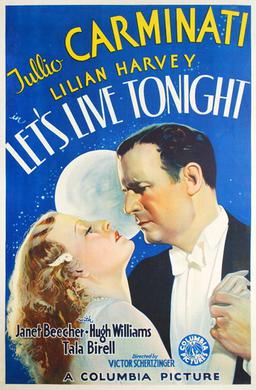
Let's Live Tonight is a 1935 American musical comedy film directed by Victor Schertzinger and starring Lilian Harvey, Tullio Carminati and Janet Beecher. The film was made as part of an unsuccessful attempt to establish Harvey, who was a top box office draw in Germany, as a major star in Hollywood. Harvey was under contract to Fox Film, but was loaned out to Columbia Pictures for the production. After making it, Harvey returned to Europe, first to Britain to appear in Invitation to the Waltz and then to Germany, where she starred in Black Roses, which relaunched her German career.

Passion is a 1925 German silent drama film directed by Richard Eichberg and starring Otto Gebühr, Lilian Harvey and Camilla von Hollay. Harvey was by this time a rising star, and followed it with her breakthrough film Love and Trumpets released the same year.

Waltz of Love is a 1930 German musical film directed by Wilhelm Thiele and starring Lilian Harvey, Willy Fritsch and Georg Alexander. It was shot at the Babelsberg Studios in Berlin with sets designed by the art director Erich Kettelhut. It premiered at the Gloria-Palast in Berlin on 7 February 1930. A separate English language version The Love Waltz was also produced.
The Love Waltz is a 1930 German English language musical film directed by Carl Winston and starring Lilian Harvey, Georg Alexander and John Batten. It is the English-language version of Waltz of Love (1930) which also starred Harvey.
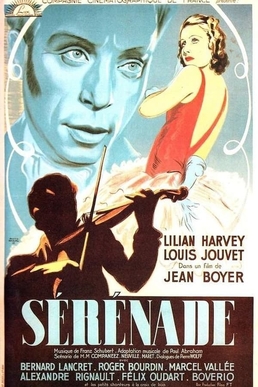
Serenade or Schubert's Serenade is a 1940 French historical film directed by Jean Boyer and starring Lilian Harvey, Louis Jouvet and Bernard Lancret. It portrays a fictional romance between the Austrian composer Franz Schubert and an English dancer. The film was the first of two the Anglo-German actress Lillian Harvey made in France, after leaving Nazi Germany.

Black Roses is a 1935 German historical drama film directed by Paul Martin and starring Lilian Harvey, Willy Fritsch and Willy Birgel. A separate English-language version Black Roses was also made with Harvey reprising her role opposite Esmond Knight. She also starred in a French version. The film was Harvey's comeback in German cinema, following her attempt to at Hollywood and then British films. One source suggested that Harvey paid for the English version of the film to be made out of her own money, as she still hoped to break into the English-speaking market.
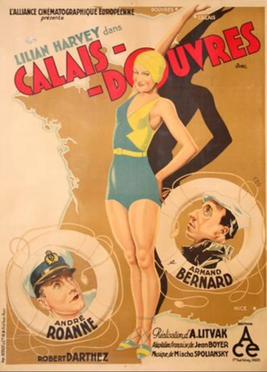
Calais-Dover is a 1931 French-German comedy film directed by Jean Boyer and Anatole Litvak and starring Lilian Harvey, André Roanne and Armand Bernard. It is the French-language version of the German film No More Love, with Harvey reprising her role. The title refers to the Dover–Calais ferry. It incorporated location shooting on the French Riviera with interiors shot at the Babelsberg Studios in Berlin. The film's sets were designed by the art directors Robert Herlth, Walter Röhrig and Werner Schlichting.

The Girl and the Boy is a 1931 comedy film directed by Roger Le Bon and Wilhelm Thiele and starring Lilian Harvey, Henri Garat, and Lucien Baroux. It was made by the major studio UFA as the French-language version of Two Hearts Beat as One, which also starred Harvey. Such multiple-language versions were common in the early years of sound before dubbing became more widespread.
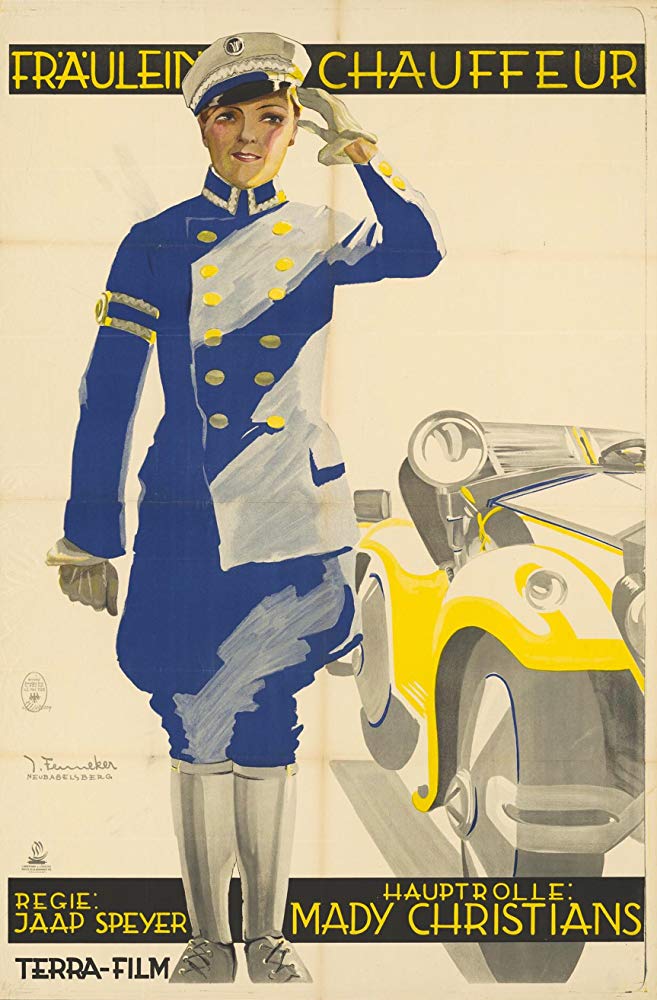
Miss Chauffeur is a 1928 German comedy film directed by Jaap Speyer and starring Mady Christians, Johannes Riemann, and Lotte Lorring. It was shot at the Terra Studios in Berlin. The film's sets were designed and part directed by the art director Hans Jacoby.
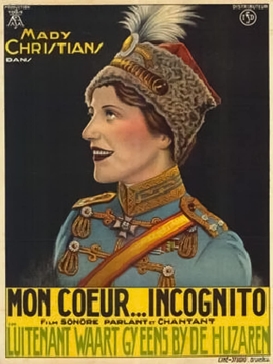
My Heart Incognito is a 1931 comedy film directed by André-Paul Antoine and Manfred Noa and starring Mady Christians. It was made by Germany's Aafa-Film as the French-language version of Lieutenant, Were You Once a Hussar?. Such multi-language versions were common during the early years of sound.
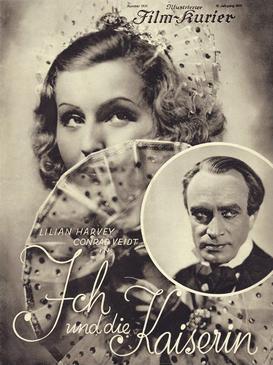
The Empress and I is a 1933 German musical comedy film directed by Friedrich Hollaender and starring Lilian Harvey, Mady Christians and Conrad Veidt. It is also known by the alternative title of The Only Girl. The film was produced as a multi-language version. Moi et l'impératrice a separate French-language version was released as well as The Only Girl in English. The multilingual Harvey played the same role in all three films.

The Weather Station is a 1923 German silent film directed by Carl Froelich and starring Mady Christians, Albert Steinrück and Hans Brausewetter.
His Majesty the Hypochondriac is a 1918 German silent comedy film directed by Frederic Zelnik and starring Lisa Weise, Karl Beckersachs, and Grete Diercks.













